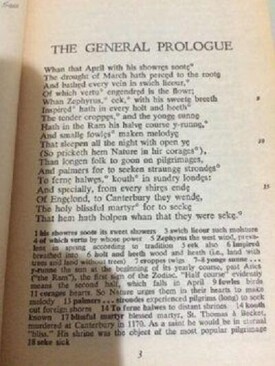中古英語
1150年到1500年間使用的英語
中古英語的語法在形態變化方面發生了簡化。名詞逐漸失去了古英語複雜的數和格的變化,簡化成了單數和複數兩種形式,複數以詞尾-s表示。形容詞則簡化成了沒有任何變化的詞類。
詞在句子中的關係不再通過性、數、格的變化來表示,而是由詞在句子中的位置來表示。
| 主格 | 所有格 | 賓格 | 名詞性所有格 | 反身 | |||
| 單數 | 第一人稱 | ic / ich / I | min | me / mi | min | mi selven | |
| 第二人稱 | þou / þu / tu | þi | þe | þin | þin selven | ||
| 第三人稱 | 陰 | sche(o) / scho | heo / hire | heo / hire | - | heo self | |
| 陽 | he | his / hisse | hine / him | his | him seluon | ||
| 中 | hit | his | hit / him | his | hit sulue | ||
| 複數 | 第一人稱 | we | ure / our(e) | us | oures | us self | |
| 第二人稱 | ye | eower / gur / eour | eow / you | youres | ou selve | ||
| 第三人稱 | heo / he / þa / þei | heore / þeir | þem | - | þamselues | ||
海 sea
鉛筆 pencel
蘋果 appel
梨 pere
男孩 boy
女孩 girl
戰爭 warre
活的 liven
人們 peple
武器 armes
盾 sheld
矛 spere
血 blod
死亡 die
食物 food
匕首 daggere
刀 knif
兵 soudier
騎士 chevaler
駐守 garison
統治 reule;governen;sweien;sweyen
統治權 dominioun
王朝 dynastie;reigne;regne
公主 princesse
貴族 nobilite;patricion
僧侶 abesse;munk;munec
教士 clergie
修道院 monasterie
牧師 preost
絞死 hongen
刑罰 penalte
中古英語文選
載自《坎特伯雷故事集》,喬叟著, 14世紀
Here bygynneth the Book of the Tales of Caunterbury
Whan that Aprill, with his shoures soote
The droghte of March hath perced to the roote
And bathed every veyne in swich licour,
Of which vertu engendred is the flour;
Whan Zephirus eek with his sweete breeth
Inspired hath in every holt and heeth
The tendre croppes, and the yonge sonne
Hath in the Ram his halfe cours yronne,
And smale foweles maken melodye,
That slepen al the nyght with open eye-
(So priketh hem Nature in hir corages);
Thanne longen folk to goon on pilgrimages
